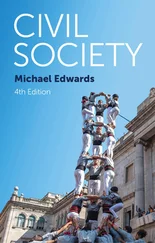Civl society
Здесь есть возможность читать онлайн «Civl society» — ознакомительный отрывок электронной книги совершенно бесплатно, а после прочтения отрывка купить полную версию. В некоторых случаях можно слушать аудио, скачать через торрент в формате fb2 и присутствует краткое содержание. Жанр: unrecognised, на английском языке. Описание произведения, (предисловие) а так же отзывы посетителей доступны на портале библиотеки ЛибКат.
- Название:Civl society
- Автор:
- Жанр:
- Год:неизвестен
- ISBN:нет данных
- Рейтинг книги:4 / 5. Голосов: 1
-
Избранное:Добавить в избранное
- Отзывы:
-
Ваша оценка:
- 80
- 1
- 2
- 3
- 4
- 5
Civl society: краткое содержание, описание и аннотация
Предлагаем к чтению аннотацию, описание, краткое содержание или предисловие (зависит от того, что написал сам автор книги «Civl society»). Если вы не нашли необходимую информацию о книге — напишите в комментариях, мы постараемся отыскать её.
dealing with the theory, history, and philosophical heritage of
the civil society, as well case studies from actual practice.
Civl society — читать онлайн ознакомительный отрывок
Ниже представлен текст книги, разбитый по страницам. Система сохранения места последней прочитанной страницы, позволяет с удобством читать онлайн бесплатно книгу «Civl society», без необходимости каждый раз заново искать на чём Вы остановились. Поставьте закладку, и сможете в любой момент перейти на страницу, на которой закончили чтение.
Интервал:
Закладка:
36 Exemplary for the banking sector: Peter Melichar, Neuordnung im Bankwesen. Die NS-Maßnahmen und die Problematik der Restitution (Veröffentlichungen der Österreichischen Historikerkommission. Vermögensentzug während der NS-Zeit sowie Rückstellungen und Entschädigungen seit 1945 in Österreich, vol. 11, Vienna – Munich 2004); Peter Eigner – Peter Melichar, Enteignungen und Säuberungen – Die österreichischen Banken im Nationalsozialismus, in: Dieter Ziegler (ed.), Banken und “Arisierungen” in Mitteleuropa während des Nationalsozialismus (Geld und Kapital, Jahrbuch der Gesellschaft für mitteleuropäische Banken- und Sparkassengeschichte, Alois Mosser, Alice Teichova, Richard Tilly (eds.), 2001, Stuttgart 2002, pp. 43–118.
Fundamental Principles of the Civil Society
Which Trends Do We Need to Protect Ourselves Against?
Werner J. Patzelt
Summary: A civil society of the Western style is not achieved once and for all. A civil society can only develop when – and for as long as – its complex cultural prerequisites exist. In addition, there are several trends that are currently endangering the civil society. As has so often been the case in history, political thought and speech are now subjected to rather strict regulations and restraints. These are guaranteed by creating taboos, and censorship imposed by oneself or others, as well as the social exclusion and condemnation of dissidents.
1. Fundamentals of a Western-style civil society
It is often the case that, when one is looking for insights that are beneficial for the present time, it is a good idea to dwell on some thoughts from the past. If these still seem plausible today, they contain lessons that have remained valid. One of the core statements in the dialogue by the Roman politician and intellectual Marcus Tullius Cicero (106–43 BC) “De re publica” fulfils this in our search for the fundamentals of a civil society: “Est […] res publica res populi, populus autem non omnis hominum coetus quoquo modo congregatus, sed coetus multitudinis iuris consensu et utilitatis communione sociatus.” Translated into English in a way that suits our purpose, this means: “The civil society is an affair of the people; however, they should not be understood as a group that has come together in one way or another, but as the collaboration of many such groups that become connected to form a society through their agreement to uniting regulations, as well as common benefits.” The principles of a civil society understood in this manner include rules that are followed jointly, as well as experiences of common benefits arising out of actions in keeping with these rules. The benefit is the common good .
Cicero’s concept is based on one of the central concepts of the Greek polymath Aristotle (384–322 BC). With the Greek city state – the polis – in mind, he spoke of the kononia politiké , the citizenry united by binding law, and binding ethics that – precisely through the acceptance and performance of public offices – aimed at a “good life” for all. Of course, neither Aristotle nor Cicero thought about equal rights for men and women. They also found the status of a slave without rights completely normal. However, restrictions of this kind, which we find intolerable today, can be shaken off without changing anything about the core concept of this kind of political vision: Self-aware citizens do not only take care of their own interests – in Greek: of tà idia , which makes them “idiots”. They also care for the interests of the community they belong to: for the common good of a polis as “politai”, and as “cives” for the common good of a “civitas”, a “res publica”.
Naturally, what we are referring to here could be described as a “civil society”. However, this term has become somewhat stale through its Marxist connotation. There, the “bourgeoisie” follows the feudal lords as a class and precedes the “civil” society of the socialist style. That is the reason that the German term “Zivilgesellschaft”, which emulates the French and English expressions of “société civile” and “civil society”, has been in use for many decades. Nevertheless, the Germanised concept of the “Zivilgesellschaft” also includes comparisons such as “civilised vs. barbaric” and “civil vs. military”. The first is absolutely reasonable, seeing that regulations, complete with their orientation on the common good, actually create important boundaries to a barbaric law of the jungle based on self-interest. The second comparison, on the other hand, is in no way appropriate. The politai of a Greek popular assembly, who practised democracy (rule by the people) were actually none other than the men of this civil society who were capable of – or had experience in – war. Indeed, in the most important form of Roman-republican popular assemblies, the – purely male – citizenry appeared in a military formation, albeit without weapons, in the so-called centuriate assemblies. It was precisely in this sense that, when the right to vote was introduced in the 19 thcentury, it was accompanied by the expansion of compulsory military service – modelled on the “levée en masse” of the self-defensive French Revolution. Germany’s first Federal President called conscription the “legitimate child of democracy” and the model of the “citizen in uniform” was developed for soldiers. It is obvious that examples of this kind fade in societies in which the following formulation became common – and which is even legally incontestable in Germany: “Soldiers are murderers”. In times of peace, which seem to be natural, it might be possible to understand and even treasure this separation between soldiery and citizenship. However, peace is like summertime in that it is often followed by a stormy period in autumn.
2. Intellectual challenges facing Western civil societies
In the meantime, another apparently self-evident fact has become fragile. This is the differentiation and contrast between the civil and religious community. This was not characteristic of antiquity and the early modern era but has definitely shaped our concept of a civil society since the Enlightenment. In the Western world, this concept of the civil society was preceded by the Christian dualism between “secular” and “religious” rule. After reciprocal, absolutely painful, disputes since the Enlightenment, the concept that – although it had been shaped by the Christianity it dialectically opposed – the Western state no longer had any need for genuinely practised Christianity to be able to develop itself as a “societas perfecta” in the sense of the Greek polis. Of course, the Western state, complete with the civil society supporting it, continued to live precisely in those conditions that had been moulded by Christianity and that it would be unable to reproduce – let alone create anew – itself. Going beyond the individual argumentative purpose – “transcending” it – these conditions include the justification for those rights to protection and freedom that have the common denominator of “human dignity”. For their part, these rights require a liberal, democratic, and social constitutional state to remain guaranteed. But as long as there is no lack of Christian, or functionally equal , prerequisites for this kind of formation of a civil society and its state, the secular state in the Western tradition only needs some kind of civil religion to give expression to its moral foundations and, ultimately, perception of sense not only discursively, but also symbolically – and, therefore, appealing to the emotions – as well as stabilising socially in this way. This religion must not necessarily be Christianity as long as it is possible to make “human dignity” the key element of social and political order convincingly.
Читать дальшеИнтервал:
Закладка:
Похожие книги на «Civl society»
Представляем Вашему вниманию похожие книги на «Civl society» списком для выбора. Мы отобрали схожую по названию и смыслу литературу в надежде предоставить читателям больше вариантов отыскать новые, интересные, ещё непрочитанные произведения.
Обсуждение, отзывы о книге «Civl society» и просто собственные мнения читателей. Оставьте ваши комментарии, напишите, что Вы думаете о произведении, его смысле или главных героях. Укажите что конкретно понравилось, а что нет, и почему Вы так считаете.












